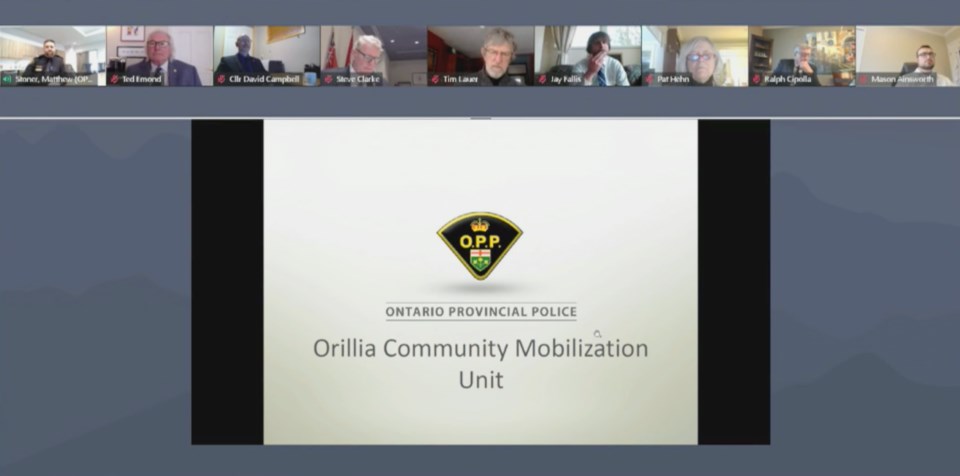Orillia OPP continues to tighten its focus on working with the community to prevent and solve criminal activity.
Insp. Veronica Eaton, detachment commander, and Sgt. Matt Stoner addressed city council Monday to provide an update on the Community Mobilization Table and the work being done by the Orillia OPP’s Community Mobilization Unit.
It’s a model that has been successfully used in municipalities including Haliburton and the City of Kawartha Lakes, Stoner said.
In Orillia, the OPP identified the need for a Community Mobilization Unit as a way to address local concerns. That includes analyzing crime, targeted enforcement, and problem solving with community partners.
One of the goals is to ultimately reduce the number of calls for service police receive, Stoner said.
Police have worked with business owners and residents in the downtown core to educate them on ways to deter and report crime.
One tool being used is called crime prevention through environmental design. Business owners are provided tips on how to make their properties less prone to criminal activity.
As an example, Stoner noted one business removed a bench to deter loitering and alcohol offences.
Coun. Ted Emond spoke about the value of the program and the importance of mobilizing the community to take action.
“In health care, we’ve come to realize that about half of the solutions for the problems we have in creating a healthy community do not lie with the professional health-care providers; they lie with the community and the various services that are available in the community,” he said, adding he believes the the same applies to issues downtown. “The program that you’ve laid out is a marvellous program and one that I’m anxious to see move forward as quickly as possible.”
He asked if the program could benefit the city when it works on projects, including a redesign of the waterfront and downtown core.
Stoner said police have suggested a city staffer be trained on crime prevention through environmental design so that knowledge can be applied to municipal projects.
Orillia OPP is relying on analytics to determine areas of the city that might need more police attention.
“Sgt. Stoner made it very very clear that they go when and where the data tells them to go,” said Mayor Steve Clarke.
That’s why he encouraged people to report any criminal activity.
“It is a meaningful thing to do,” he said.
Coun. Ralph Cipolla asked about the possibility of using drones to combat crime.
Eaton said police use drones for search-and-rescue operations but not enforcement.
Clarke said the city’s Security Camera Resource and Mapping (SCRAM) program would likely “negate” the need for drones.
SCRAM will encourage residents and business owners to set up security cameras on their properties and register the co-ordinates with Orillia OPP.
Council previously approved $100,000 for the program, seeing it as a solution to the inadequate surveillance camera system downtown.
A report is expected to be presented soon to the Orillia Police Services Board and Clarke hopes to see the program launch in the spring.
The Community Outreach and Support Team (COAST) also involves community mobilization and has seen success. The OPP teams up with Canadian Mental Health Association (CMHA) workers to respond to mental health calls, with the goal of keeping people out of jail and connected with appropriate services and supports.
Stoner noted there have been more than 1,000 “interventions” through the COAST program.
Also, six people who were turned away from other support services due to behavioural issues were able to find other support thanks to COAST.
COAST was recently expanded to include two CMHA workers. The funding that made that possible will only last until the end of March, but Stoner hopes to see it continue. He said the CMHA is looking at the possibility of getting funding from partner agencies.
